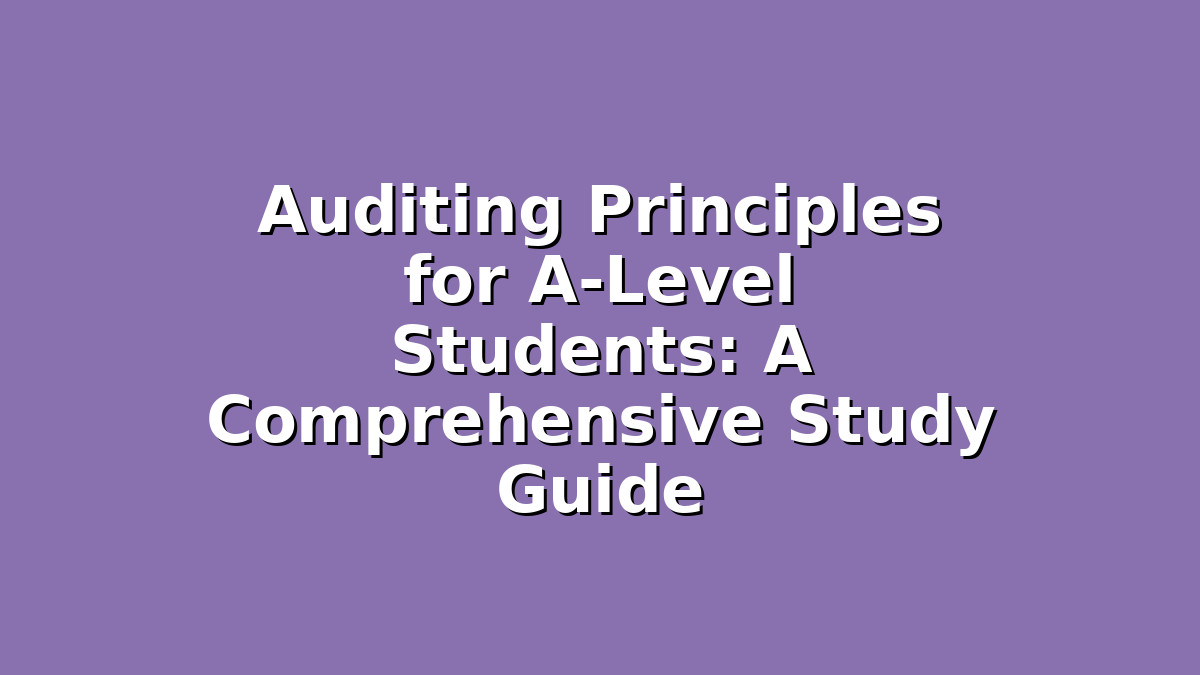Preparing for A-Level exams can be a challenging yet rewarding experience, especially when tackling subjects like Accounting that include complex topics such as auditing principles. Understanding auditing is essential not only for exam success but also for building a strong foundation if you plan to pursue accounting or finance-related courses in the future. This guide is designed to help A-Level students grasp key auditing principles, offering practical study tips and insights to ensure you excel in your exams.
What Are Auditing Principles?
Auditing principles refer to the fundamental rules and guidelines that govern the process of auditing—an independent examination of financial records and statements to ensure accuracy and compliance with laws and regulations. For A-Level students, mastering these principles means understanding the purpose, types, and process of audits, along with the ethical standards auditors must follow.
Auditing principles help establish trust in financial information, which is crucial for investors, management, and regulatory authorities. Your A-Level syllabus will typically cover areas such as the objectives of an audit, the qualities of an auditor, audit evidence, and common audit procedures.
—
Section 1: Understanding Core Auditing Principles
To succeed in your exams, start by familiarizing yourself with the fundamental auditing principles. Here are some key concepts you should focus on:
– Integrity and Objectivity: Auditors must be honest and impartial when examining financial records, avoiding any conflicts of interest.
– Professional Competence: Auditors are required to maintain their skills and knowledge through ongoing education.
– Confidentiality: Information obtained during an audit should be kept private except when disclosure is authorized or legally required.
– Audit Evidence: The auditor must gather sufficient and appropriate evidence to support their opinion on the financial statements.
– Materiality: Auditors focus on significant errors or omissions that could influence the decisions of users of financial statements.
Study Tip: Create flashcards with definitions and examples of each principle. Regularly quiz yourself or with a study group to reinforce your understanding.
—
Section 2: The Audit Process Explained with Exam Preparation in Mind
A clear understanding of the audit process will help you answer exam questions effectively. Here’s a breakdown of the typical audit stages:
1. Planning the Audit: This initial stage involves setting objectives, understanding the client’s business, and identifying risk areas. Knowing what to look for saves time and effort.
2. Conducting Fieldwork: The auditor collects evidence by inspecting documents, observing procedures, and performing tests.
3. Evaluating Evidence: Auditors analyze the gathered information to assess whether the financial statements are free from material misstatement.
4. Reporting: The final audit report communicates the auditor’s opinion on the accuracy and fairness of the financial statements.
Study Tip: Use diagrams or flowcharts to visualize the audit process. This will help you remember the sequence and purpose of each step when answering exam questions.
—
Section 3: Effective Study Strategies for Auditing Principles
Auditing can seem overwhelming at first, but with the right techniques, you can master the material confidently. Here are some practical study strategies tailored for auditing principles:
– Practice Past Papers: Exam-style questions help you apply theory to real scenarios. Focus on questions related to audit objectives, evidence, and reporting.
– Group Discussions: Explaining auditing concepts to peers or discussing case studies can clarify difficult topics and deepen your understanding.
– Use Real-Life Examples: Connect auditing principles to current events or business news. Understanding how audits impact companies in the real world makes the subject more engaging.
– Summarize Key Points: Write concise notes or mind maps covering each auditing principle. Summaries make revision faster and more effective.
– Seek Help When Needed: Don’t hesitate to ask teachers or tutors for clarification on complex topics. Online resources and video tutorials can also provide alternative explanations.
Study Tip: Schedule regular short study sessions instead of long cramming hours. Consistent review aids long-term retention and reduces exam stress.
—
Conclusion
Auditing principles are an integral part of your A-Level Accounting syllabus and mastering them will not only boost your exam performance but also equip you with valuable skills for the future. By thoroughly understanding the core concepts, familiarizing yourself with the audit process, and adopting effective study strategies, you can approach your exams with confidence and calm. Remember, consistent effort and a positive mindset are your best allies in exam preparation. Keep practicing, stay curious, and don’t be afraid to seek support when needed. Good luck—you’ve got this!

Responses